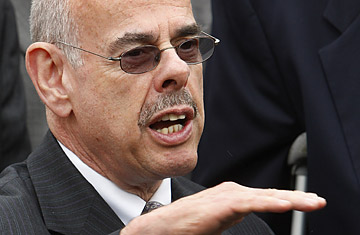
Rep. Henry Waxman, D-Calif. speaks to reporters after Democrats serving on the Energy and Commerce Committees met with President Barack Obama, Tuesday, May 5, 2009, in Washington.
What it comes to national energy policy, the grand bazaar is open.
With Republicans unanimously opposing the climate change bill in the first House committee to consider it, the haggling is taking place among Democrats. On one side are those trying to pass landmark global warming legislation, and on the other, those seeking concessions in it to ease tough pollution standards on their districts and local industries. The first deal was struck Monday: up to $4,500 as an inducement to trade in gas-guzzlers for new, fuel-efficient vehicles that will emit smaller quantities of warming gases into the atmosphere. (See pictures of the fragile planet.)
Detroit, not surprisingly, loves the plan, which makes Rep. John Dingell, the powerful automaker ally, more likely to support broader legislation. But the clunker proposal's passage is no indication that the broader bill will have an easy time of it. A rare win-win for industry and the environment, it didn't require any of the the trade-offs being discussed to pass the "cap and trade" measure at the center of the House global warming bill. Introduced April 1, the measure would require all sources of warming gases — produced by the burning of coal, oil and natural gas — to cap their emissions at 20% of 2005 levels by 2020. If they exceed their limits, polluters can buy credits from cleaner sources.
The bill's first hurdle is the Energy and Commerce Committee. Facing blanket GOP opposition, Chairman Henry Waxman is seeking a majority among Democrats and negotiating separately with a number of members who represent regional and constituent concerns. Agreements have not quickly fallen into place, however, prompting a pair of developments Monday: a pep talk by President Obama, who reiterated his support for such legislation at a 90-minute White House meeting with Waxman and colleagues, and a public acknowledgement of the lack of consensus by House Majority Leader Steny Hoyer, who told reporters,: "Whether it's a gridlock or not, I don't know." (See the effects of climate change.)
Waxman told TIME his behind-the-scenes negotiations have been more fruitful than it may appear, and will pay off in committee approval of a bill by Memorial Day, a prediction many of his colleagues embrace. Still, it won't be easy, since his committee reflects the interests most directly affected by the legislation. Members from the Midwest and East where coal is abundant fear that tougher standards would fall disproportionately on coal-fired utilities, forcing a shift to less polluting but more costly natural gas — and a spike in household electric bills. They are asking Waxman to grant free pollution credits to those utilities as well as to raise the cap and stretch out the timeline for reduction of warming gases until technology is developed to capture them. Representatives of energy-intensive industries that have global competition — steel, aluminum, concrete, chemical and pulp and paper — are seeking credits if they produce less carbon dioxide per ton of output than the international average for each industry.
With oil refineries targeted as the point of control for vehicular sources of warming gases, Texans are fighting for the same concessions as other energy-intensive industries. A proposal that renewable resources account for 25% of electricity by 2025 has upset Southerners, who lack the solar and geothermal energy of other regions. They are seeking credit for nuclear and hydroelectric power more plentiful in their part of the country.
The task for Waxman is to grant the concessions he needs to form a majority for a bill without diluting its environmental benefits. His current focus, he said, is to assure that no part of the country bears a disproportionate share of costs. But, regardless of concessions, he added, the emissions cap will guarantee that "environmental integrity" is preserved.
